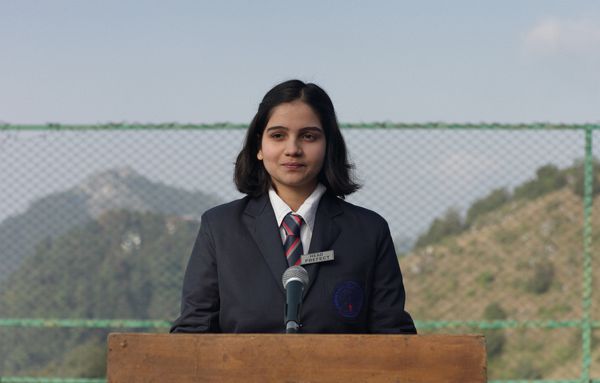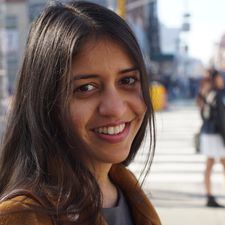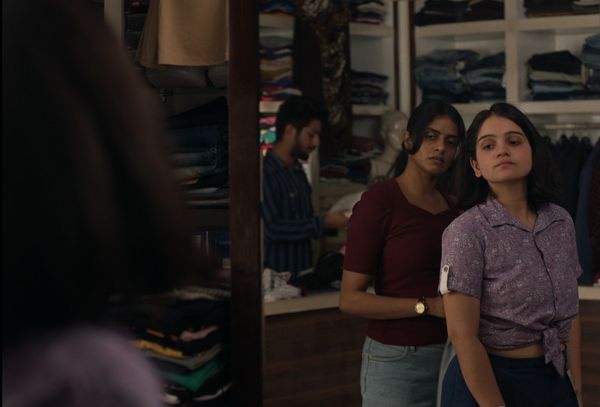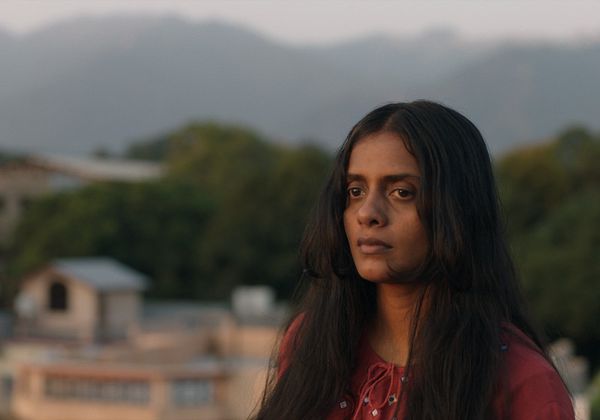 |
| Preeti Panagrahi as Mira. Shuchi Talati: 'With every character I really tried to be there in the complexity and the kinds of multiple motivations that drive a person' |
I was reading about how you viewed the film as a kind of act of rebellion against your own school days. It’s interesting because you also say you were a good student, and I wondered about this sort of tension between wanting to have your own life, but within a kind of cultural obeying of the rules was something you wanted to explore.
Shuchi Talati: Very much so. I grew up with this, like, tension so internalised. I was a very good student, I was the teacher's pet, I was the head prefect of my school. And I really relished the social caché that gave me. That was the way to get ahead, get recognised and even to get affection from the grown ups around you. So I was very much a toe-the-line student on the one hand, and then internally, of course, I was a teenager, with raging hormones, I had a secret boyfriend – and no one knew about him, not even my best friend – so I had this other side of me.
 |
| Shuchi Talati: 'The Nineties was when I was a teenager, so I remember it very vividly' |
Anila, the mother character, is also fascinating because the film speaks to her experience of having gone through an oppression of these ideas as a younger person. It’s almost as though her daughter’s rebellion is fuelling her own.
ST: Totally. I kind of always saw it as a dual coming of age or the kind of the story of two generations of women who are both fighting against the boxes that society tries to put them in. And I think you're totally right, that seeing her daughter blossom into a young woman and trying to fight to give her the freedoms that she didn't have, so the freedom to date the freedom to buy a cute miniskirt, the freedom to go out with your friends, and stand up to her husband. She is trying to do better by her and give her more than she had. At the same time, that creates some envy or sadness for a youth that she didn't get to have and sparks some kind of awakening in her as well.
Although this is a feminist film, and the focus is on the mum and daughter, you don't overlook Sri’s role in all of that, because his motivations are also quite complex. They're not just coming from him being a teenager, they're coming as well from his parental lack of a support network and. How was it to be writing that male character in between these two very important female characters?
ST: I appreciate you commenting on the complexity because I think with every character I really tried to be there in the complexity and the kinds of multiple motivations that drive a person. For Sri, yes, he really cares for Mira, and he probably really cares for Anila.
Also his parents seem somewhat neglectful. So to be in this home, where he's the centre of attention and receives a lot of care is actually deeply nurturing for him. And he's a teenage boy who probably enjoys two women vying for his attention. And he's using the charm that has become sort of like a survival mechanism for him, because he’s somebody who's moved around a lot, and has to quickly find his way in social circles. I think writing him was not very different from writing the other characters where I really tried to hold all of that complexity in my head.
The setting of northern India is also a bit different from the urban environments we mostly see captured on film from the country. Was that because you wanted to break away from places people see more often in Indian cinema.
ST: On the one hand, it made a lot of sense because boarding schools in India are often clustered around mountain towns, for reasons that I don't quite understand. So this particular part of India where we shot the film probably has more than 100 boarding schools. And I think you're right that I feel like I'm a little tired of the images of India that make it out, especially to the West to be the hustle and bustle and the overly saturated colours, which can feel like exoticising. Not that that is not India, but India is a country of 1.4 billion people and very varied landscapes. So I really wanted to stray from that aesthetic, tell a different type of story in a different type of setting and take out a more muted colour palette that came from the colours of the Himalayan Mountains, the blue green.
You’ve chosen to set the film in the Nineties, was that because it was a period that was interesting or familiar to you or for another reason?
ST: It was definitely interesting and familiar, because the Nineties was when I was a teenager, so I remember it very vividly. There's also, of course, the storytelling reason. In the Nineties, when we didn't have cell phones or Facebook, or Instagram, TikTok. If you had to sneak around, you really had to do these elaborate charades and do signals with your landline, that your mom could pick up the other end of. So I think that was interesting to me.
But also the Nineties was a really interesting time in India, in the early Nineties, the Indian economy was, they call it liberalised, which basically meant opening it up to Western imports. Before that, post-independence, the Indian economy had sort of been protected. So suddenly, by the mid to late-Nineties, we had western TV shows, mostly American pop culture, come to India. You could buy a pair of Levi's, you could buy a miniskirt. All of these things as a teenager, I remember, became signs of rebellion.
It was really interesting because the teenagers were early adopters, and their parents were not, so the mums would still be pretty traditionally dressed. Except for the outliers – and those mothers were judged harshly for getting corrupted by Western values, and corrupting, by extension, their daughters. No one cared if the sons wore jeans but if the daughters were wearing pants, your auntie would be like, “You look so much nicer when you wear a skirt”. So in this setting, I also wanted to use it to make Anila, the mum, stand out. You see that she's often dressed in jeans unlike the other women of her age.
Can we talk a bit about your cast? Kani Kusruti, who plays Anila, is having a great year. She’s also phenomenal in All We Imagine As Light, so how do you go about casting when you’ve got someone as established as her but also much younger cast members?
ST: I’m so delighted for Kani, it’s long deserved. I've been a huge fan of hers for years. I remember I first saw her in a short film called Counterfeit Kung Fu, which also went to Sundance, and she was superb in it. So Kani was always on our list. And when I brought her up at our first meeting with our casting director, Dilip Shankar he was like, “Oh, I'm so glad to hear her name. I love Kani”. So we're both big fans. So as soon as she sent in her audition tape, which was the first time Anila meets Sri, I just remember being riveted because she has this amazing livewire quality, where you watch her and you don't know what she's going to do. Like, is she going to smile? Is she going to snap? And I think it felt like such an important quality for the mother character to have. So yeah, I think I watched her audition multiple times, like an obsessed, crazy person being like, I hope she says yes.
In the meanwhile, we were doing a wide search for the young actors, which we knew was going to be challenging, partly because these are difficult roles. Also, because they have intimacy and I knew that there were many actors who would say no, just outright. India is still pretty conservative about sexuality. And so we did a wide search, both auditioning actors who had credits in Bollywood and regional cinema, because there's so much cinema in India and there are lots of young actors who've done work. And we did a wide open call across India – and both our leads came from the open calls. Preeti was in college in Delhi and Kesav was in engineering school in Jaipur.
They were both immediate standouts just because Preeti had a kind of strength to her and a kind of dignity that she brought to Mira. Even when she was flirting and all of that she kind of held on to this sense of self. And Kesav brought this amazing tightrope walk between being both nice and vulnerable, but also really charming and sort of being able to appeal both to the daughter and the mum. So being boy enough and man enough. We brought them all to Bombay to do a chemistry test and, and I think it was immediately apparent to us that this was our cast.
I think Kani immediately felt a connection to Preeti. I think Preeti had admired Kan’s work so I think she was a little nervous in the first audition but she's really a very smart actor who can hold her own and is psychologically very similar to Mira. So she just had access to this character psychology in a way that seemed like instant and effortless.
Working with them, I didn't really distinguish between how I worked with them based on their levels of experience. Kesav and Preeti were able to do a little bit of acting training with our amazing casting director, Dilip Shankar, who offered to train them just like for a few days, and give them some more tools in their actor toolbox. At the end of that training I went in for a couple of days so that we developed a way of talking to each other. And, and then on set, I think the moments where you would really feel Kani’s seniority was when we were at the end of the day and losing light, everyone's in a rush. And Kani snapped into not just being like the actor, but sort of like partially the assistant director and should be to the kids, “Okay. Just come on, take your positions, remember your lines.” and saying, “Okay, what do you need me to do?”
She's such an amazing team player. She's an incredible technically sound actor, she’ll always hit her marks, always catch the light. Yet, she manages to keep some sense of not not knowing totally what she's going to do in the scene. So physically she can map it out but emotionally she allows herself to find it take after take. I think the young actors probably saw that and learned from that, because she was so generous. All three of them were there to give each other their 100 per cent.
Girls Will Be Girls is screening at Cheltenham Film Festival and will be released across the UK by Modern Films on September 20























